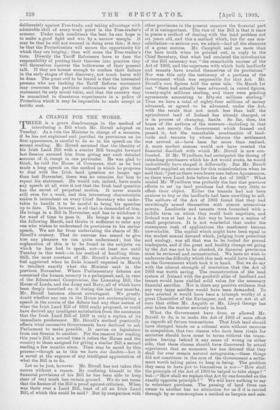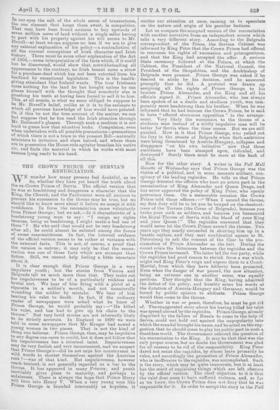A CHANGE FOR THE WORSE. T HERE is a grave disadvantage
in the method of introducing a Bill which Mr. Birrell adopted on Tuesday. As a rule the Minister in charge of a measure, if he has not explained and justified its provisions on its first appearance, is careful to do so in his speech on the second reading. Mr. Birrell assumed that the identity of his Irish Land Bill with a similar Bill brought forward last Session excused him from giving any such detailed account of it, except in one particular. He was glad to think, he told the House of Commons, that as he bad made a long speech on the method in which he proposes to deal with the Irish land question no longer ago than last November, there was no occasion for him to repeat his statement. He would not, indeed, have made any speech at all were it not that the Irish laud question has the secret of perpetual motion. It never stands still even for a week, and this interesting characteristic makes it incumbent on every Chief Secretary who under- takes to handle it to be careful to bring his speeches up to date. This, however, is all that is demanded of him. He brings in a Bill in November, and has to withdraw it for want of time to pass it. He brings it in again in the following March, and thinks it sufficient to refer any one who wishes to understand its provisions to his earlier speech. We are far from underrating the charm of Mr. Birrell's oratory. That its exercise has ceased to give him any pleasure we can quite understand ; but the explanation of this is to be found in the subjects on which he has had to speak, not—at least not until Tuesday in this week—in his method of handling them. Still, the most constant of Mr. Birrell's admirers may feel aggrieved when he finds himself expected in March to recollect exactly what the Minister said in the previous November. Where Parliamentary debates are concerned the human memory is a palimpsest, and, in view of the Educational Compromise, the Licensing Bill, the House of Lords, and the Army and Navy, all of which have been deeply inscribed on it during the last four months, Mr. Birrell becomes almost extravagant. We greatly doubt whether any one in the House not contemplating a speech in the course of the debate had any clear notion of what the Irish Laud Bill of 1908 really proposed, or could have derived any intelligent satisfaction from the assurance that the Irish Land Bill of 1909 is only a replica of its immediate predecessor. Mr. Birroll's method practically effects what successive Governments have declined to ask Parliament to make possible. It carries on legislation from one Session to another. For the reasons for reading this year's Bill a second. time it refers the House and, the country to those assigned for giving a similar Bill a second reading a few months since. Time may be saved by this process—though as to this we have our doubts—but it is saved at the expense of any intelligent appreciation of what the Bill is to do.
Let us be just, however. Mr. Birrell has not taken this course without a reason. By confining himself to the financial provisions of his Bill he has been able to keep clear of very much less certain ground. We do not mean that the finance of the Bill is proof against criticism. When was there ever a Land Bill, least of all an Irish Laud. Bill, of which this could be said? But by comparison with other provisions in the present measure the financial part of it is unimportant. The vice of the Bill is that it tears in pieces a method of dealing with the land problem not six years old, and this a method which, but for one mis- calculation—a serious one, we admit—bad all the elements of a great success. Mr. Campbell said no more than the bare truth when he pointed out, in reply to the Chief Secretary, that what had rendered the introduction of the Bill necessary was "the remarkable success of the Act of 1903, and. the eagerness with which both landlords and tenants have availed themselves of its provisions." Nor . was this only the testimony of a partisan of the Government which was responsible for that Act. Mr. Birrell's own figures told the same tale. On March 1st last "there had actually been advanced, in round figures, twenty-eight millions sterling, and there were pending agreements amounting to fifty-six millions sterling." Thus we have a total of eighty-four millions of money advanced, or agreed to be advanced, under the Act, with the result that not much less than half the agricultural land of Ireland has already changed, or is in process of changing, hands. So far, then, the hopes of the authors of the measure—including in that term not merely the Government which framed and passed it, but the remarkable combination of land- lords and tenants by whose labours the settlement was arrived at—have been far more than realised. A. more modest success would not have created the financial deadlock with which Mr. Birrell is now con- fronted. If Mr. Wyndham had anticipated the throng of intending purchasers which his Act would evoke, he would. undoubtedly have shaped it differently. But Mr. Birrell himself supplied an excuse for this miscalculation whoa he said that," just as there were brave men before Agamemnon, so there were Land Acts before the Act of 1903." What misled Mr Wyndham was probably the fact that previous efforts to set up laud purchase had done very little to effect their object. Either the tenants had not been anxious to buy or the landlords had been unwilling to sell. The authors of the Act of 1903 found that they had unwittingly armed themselves with almost miraculous powers. Landlords and tenants were furnished with a middle term on which they could both negotiate, and Ireland was at last in a fair way to become a nation of small proprietors. It is not wonderful that under the consequent rush of applications the machinery became unworkable. The capital which might have been equal to the modest annual demand which, judging from precedent and analogy, was all that was to be looked for proved inadequate, and if the great and healthy change set going by the Act was not to be checked, its financial provisions must be reviewed and reconstructed. We have no wish to underrate the difficulty which this task would have imposed. on the Government which took it in hand. But we do say with the utmost strength of conviction that the Act of 1903 was worth saving. The reconstruction of the land system of Ireland with the goodwill alike of landlord and. tenant would have yielded solid value for the necessary financial sacrifice. Nor is there any positive evidence that any very large sacrifice would have been demanded. To have averted it would have been a triumph worthy of a great Chancellor of the Exchequer, and we are not at all sure .that either Mr. Asquith or Mr. Lloyd George has ever taken the matter seriously in hand.
What the Government have done, or allowed Mr. Birrell to do, is to make the Act of 1903 of none effect as regards all future transactions. That Irish land should. have changed hands on a colossal scale without recourse to compulsion, that two classes who have been rivals for centuries should have come to terms without the trans- action leaving behind it any sense of wrong on either side, that these classes should have discovered by actual experiment that no economic law has decreed that they shall for ever remain natural antagonists,—these things did not constitute in the eyes of the Government a settle- ment worth taking pains to keep in being. The problem they seem to have put to themselves is not—" How shall the principle of the Act of 1903 be helped to take shape ? " but—" How shall we replace that Act by one founded on the exactly opposite principle?" We will have nothing to say to voluntary purchase. The passing of land from one owner to another has no attraction for us if it is carried through by so commonplace a method as bargain and sale. In our eyes the salt of the whole series of transactions, the ono element that keeps them sweet, is compulsion. That men have been found anxious to buy upwards of seven million acres of land without a single seller having to part with his property against his will seems. to Mr. Birre11—at least we can suppose no less if we are to give any rational explanation of his policy—a contradiction of all the current conceptions of Irish character and Irish history. There must be some other explanation of the Act of 1903,—some interpretation of the facts which, if it could but be discovered, would show that, notwithstanding all appearances to the contrary, no Irish tenant cares a straw for a purchase-deed which has not been extorted from his landlord by exceptional legislation. This is the health- giving stimulant that Ireland wants. The true Irishman cares nothing for the land he has bought unless he can Please himself with the thought that somebody else is gnashing his teeth at having been forced to sell it to him. Ibis, at all events, is what we seem obliged to suppose to be .Mr. Birrell's belief, unlike as it is to the estimate to Which all previous knowledge of him would have pointed. Or, if this be not the true account of the matter, we can but suppose that he has read the Irish situation through Mr. Redmond's glasses.. Through such a medium it is not hard to guess how that situation looks. Compulsion, even When undertaken with all possible precautions—precautions of:which there is not a trace in the present Bill—naturally ministers to irritation and class hatred, and where these are in possession the Home-rule agitator breathes his native air, and finds the material in which he works with most success lying ready to his hand.











































 Previous page
Previous page